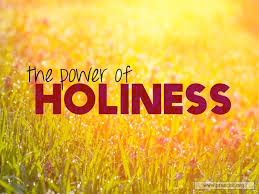Character Traits of the Spiritual Life:
Holiness
Richard Hollerman
Would you consider yourself a holy person? How do you look on the subject of holiness? False religion may refer to a man as “Holy Father” or a religious place as a “Holy Sanctuary.” However, the Biblical view of holiness is far different from this. The Hebrew qadash basically means “separation.” In the Old Testament period, there were “holy” priests, “holy” days, a “holy temple,” and “holy” practices. The New Testament goes beyond this and emphasizes “holy” people and a “holy” life.
Holiness is based on God’s own holiness. God is “majestic in holiness” (Exodus 15:11), His words are holy (Jeremiah 23:9), His name is holy (Leviticus 20:3), His Spirit is holy (Isaiah 63:10). The New Testament continues and expands this view of God’s personal holiness. God is holy and true (Revelation 6:10) and He is called the “Holy Father” (John 17:11). His name is holy (Luke 1:49) and the four living creatures of Revelation say, “Holy, holy, holy is the Lord God, the Almighty, who was and who is and who is to come” (4:8). Christ Jesus is also called holy—“the Holy and Righteous One” (Acts 3:14) or God’s “holy servant Jesus” (4:27, 30; cf. 1 John 2:20). Continually, we read of the Spirit being holy, generally with the designation, “the Holy Spirit” (Acts 1:5; 1 Corinthians 6:19; Ephesians 1:13; etc.).
Based on the holiness of God (as well as Christ Jesus and the Spirit), we are called to be holy ourselves. Peter explains this connection: “As obedient children, do not be conformed to the former lusts which were yours in your ignorance, but like the Holy One who called you, be holy yourselves also in all your behavior; because it is written, ‘You shall be holy, for I am holy’” (1 Peter 1:14-16).
We are to be separate from our former sinful life and are to live a new life of purity and cleanliness. Since God is holy, we also are to be holy! We are not given a bare command (which would be good enough), but we are given the reason why we are to live holy, separated, pure, and righteous lives—because we belong to a holy God who is our Holy God and Father! “In the New Testament, holiness is true goodness woven through the lifestyle of the believer and expressed in every daily activity and in every relationship.”[i][i]
When one comes to Christ to be saved, he becomes a “saint”—one who is separated from the world and sin and separated to God and His service. Paul writes to “all who are beloved of God in Rome, called as saints” (Romans 1:7). “Saints” translates the Greek hagioi, meaning “holy ones” or “separated ones.” A saint is a holy person. “Its OT antecedence implies the idea of being set apart for God as well as conformity to God’s likeness through the work of the indwelling Holy Spirit.”[ii][ii]
It doesn’t refer to a special class of religious people who have died and been canonized by a Roman “pope,” but it refers to all of those who have been saved by God. In this case, Scripture is referring to one whose standing is one of separation from sin, but more often we are commanded to be separated morally and spiritually, which refers to our state or condition. The term saints is found frequently in Scripture (cf. Acts 9:13, 32, 41; 26:10; Romans 15:25-26, 31; 16:2, 15; 1 Corinthians 1:2; 2 Corinthians 1:1; Ephesians 1:1; Philippians 1:1; Colossians 1:2).
As saved and forgiven men and women, we are to live holy lives of complete devotion to God. Paul writes, “I urge you, brethren, by the mercies of God, to present your bodies a living and holy sacrifice . . . . And do not be conformed to this world, but be transformed by the renewing of your mind” (Romans 12:1-2). This is especially true in our lifestyle, including the sexual aspect. Thus Paul could write, “This is the will of God, your sanctification[iii][iii] [holiness]; that is, that you abstain from sexual immorality. . . . For God has not called us for the purpose of impurity, but in sanctification [holiness]” (1 Thessalonians 4:3, 7). To establish this principle, Paul then reasons, “So, he who rejects this is not rejecting man but the God who gives His Holy Spirit to you” (v. 8). Since we have the Spirit who is holy, we also are to be holy in our conduct!
We are holy people and are to maintain holiness in the body of Christ. We are part of “a holy nation” (1 Peter 2:9) and a holy temple—“the temple of God is holy, and that is what you are” (1 Corinthians 3:17). Paul tells his readers that they are to “greet one another with a holy kiss” (Romans 16:16; cf. 1 Corinthians 16:20; 2 Corinthians 13:12; 1 Thessalonians 5:26). Our lives are to be holy lives. Those who are “unholy” are not of Christ (2 Timothy 3:2; 1 Timothy 1:9) but those who do know the Lord are holy and must grow in holiness. But how vital is this holiness? Hebrews 12:14 answers this: “Strive for peace with everyone, and for the holiness without which no one will see the Lord” (ESV). Holiness definitely must be central to our character.
[i][i] Richards, Expository Dictionary.
[ii][ii] Grenz, Guretzki, and Nordling, Pocket Dictionary of Theological Terms.
[iii][iii] The term “sanctification” is often translated holiness and “sanctify” is translated as make holy. It may also be rendered, set apart.






 You can reach us via e-mail
at the following address:
You can reach us via e-mail
at the following address: